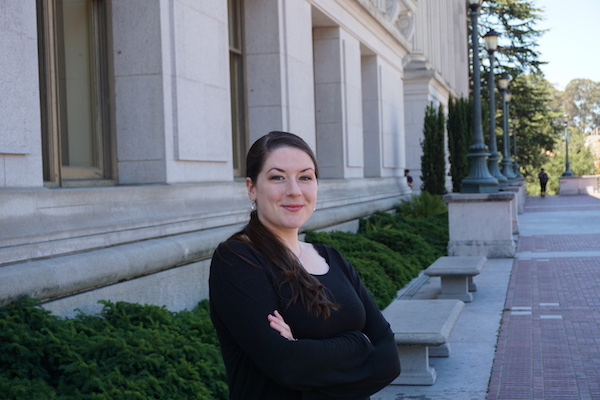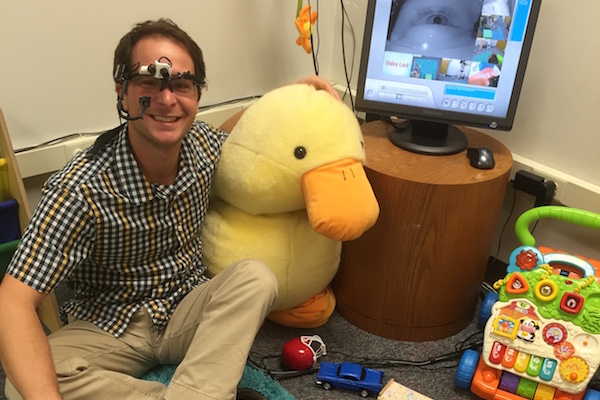We followed up with Drs. Alexandra Paxton and Drew Abney about their new adventures. Both recent Ph.D. graduates from UC Merced’s Cognitive & Information Sciences program, Alex is one semester into her postdoc at UC Berkeley on big data, and Drew is beginning his postdoc at Indiana on developmental dynamics. We asked them some questions about their ongoing work.
Alexandra Paxton
Where is your new position, with whom, and what new work are you doing?
I’m a postdoctoral scholar working with Tom Griffiths in the Institute of Cognitive and Brain Sciences and a Moore-Sloan data science fellow with the Berkeley Institute for Data Science (BIDS), both at the University of California, Berkeley. My position in ICBS is funded by an NSF grant aimed at creating resources to help bridge the gap between cognitive science and big data, and my fellowship is funded by the Moore-Sloan Data Science Environments, an initiative dedicated to increasing cross-disciplinary data science.
With these joint appointments, I’m able to work toward increasing data-rich explorations of human communication and interaction. A significant component of this focus lies in creating, improving, and sharing resources for data-intensive science with cognitive scientists at all career stages, in part through the Center for Data on the Mind (dataonthemind.org). Taking this data-rich approach is pivotal to my new research projects, which include exploring joint action through large-scale experimental games, understanding team dynamics through real-world competitive gameplay data, and modeling joint action with a blend of dynamical systems and Bayesian perspectives.
What are your goals over the next year or two?
As a researcher, I plan to continue blending real-world and experimental data to understand interaction while creating new tools for data collection, data analysis, and data sharing. As a member of the cognitive science community, I plan to increase outreach through creating workshops and resources for those interested in data-rich science, open science, and reproducibility. I intend to apply for grants to help support these fundamentally interrelated goals. I also plan to apply for faculty positions.
How did the CIS program prepare you for this position?
UC Merced’s unique position as the first 21st-century research institution fostered an atmosphere of interdisciplinarity that embraces new perspectives and techniques. The CIS program encouraged me to develop my own research program and supported me as I pursued the skills that I needed to do so, all within the framework of intellectual curiosity and theoretical grounding. Through camaraderie and a collective commitment to forward-thinking science, the CIS program helped me foster the skills and mindset needed to become an independent but fundamentally community-oriented researcher focused on blending new and traditional perspectives in cognitive science.

Drew Abney
Where is your new position, with whom, and what new work are you doing?
I am a postdoctoral fellow in the Department of Psychological and Brain Sciences at Indiana University working with Drs. Chen Yu and Linda Smith. My fellowship is funded by the National Institutes of Health Developmental Training Grant focused on integrative developmental processes. At IU, I am developing a research program focused on the dynamics and development of communication. Recent projects I am working on include analyzing the temporal dynamics of previously collected naturalistic infant-perspective head camera images, developing new methods for quantifying the sequential structure of parent utterances during child-parent interactions, and applying models of coordination developed in my dissertation at UCM to study multimodal communication.
What are your goals over the next year or two?
As my research program matures, I plan to apply for specific grants that encourage and support increased independence as a young researcher. I am also taking the time to learn the mechanics of running a productive developmental lab that focuses on multimodal dyadic models of human interaction, which I am learning is no small feat! I will likely also apply for tenured-track academic positions in the next few years.
How did the CIS program prepare you for this position?
The momentum of science and research funding is geared towards researchers who can work well with others within and across disciplines. UC Merced’s CIS program created an environment for me to grow as an independent thinker while also providing encouragement to expand my academic social network and research skills across a wide range of scientific disciplines.




